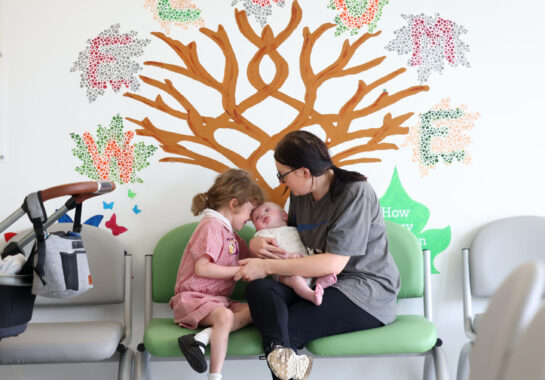What to know when you visit Alder Hey
Infection Prevention Guidance During Your Visit
Children and young people can be at a higher risk of getting an infection when they are ill. The body has natural defence mechanisms to fight off infections, but these may be affected for a variety of reasons when someone is in the hospital.
Please speak to staff in the department or ward to confirm visiting times.
What you and your visitors can do to help us minimise the risk of infections during your child’s stay:
- If unwell, and you or any of your visitors have had any of the following symptoms in the last 48 hours please do not visit the hospital until symptom free – speak to ward staff for advice.
- Cough
- High temperature
- Diarrhoea or vomiting
- If you start to feel unwell while at the hospital, remain in the cubicle with your child. Alert staff for advice and do not mix with other parents or families.
- If you are staying at Ronald McDonald House, please inform the staff there too.
- If your child has had contact with someone who has an infectious disease (such as chickenpox, shingles and measles) or has developed a rash, please alert the staff on admission. This will help us to prevent it spreading to other children and families.
- If one of your other children has been in contact with someone who has an infectious disease, do not bring them to the hospital to visit. Please speak to staff to find out when it is OK for them to visit.
Attending a clinic/outpatient appointment
To minimise the risk of infections, please call the number on your letter and inform staff before arriving for your appointment if you, or your child, have any of the symptoms below:
- Cough
- High temperature
- Diarrhoea or vomiting
- Rash
- If your child has had contact with someone who has an infectious disease (such as chickenpox or measles)
Please note
If you are unable to contact the department, please alert a member of staff on arrival to the department.
This will help us to prevent it spreading to other children and their families.
What not to do when visiting someone in hospital
- Do not share a patient’s toiletries, tissues or hospital equipment with other patients or leave them in communal areas.
- If your child is known to have an infection and requiring isolation, please do not mix with other patients and their families.
- Do not touch the patient’s wounds or any medical equipment they’re attached to such as drips or catheters. This can cause infections.
- Do not pour tea, coffee or other liquids down the sinks located in a patient´s room or wash clothing in them. This can contaminate our water.
We thank you for your cooperation and hope that you enjoy your visit to Alder Hey.
